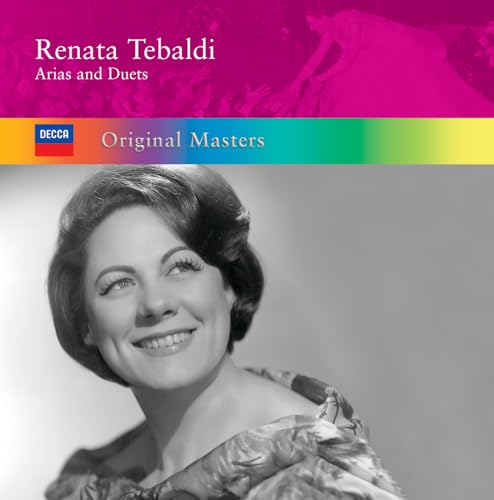













































































ÔäŚ This Compilation 2006 Decca Music Group Limited ┬ę 2006 Decca Music Group Limited
Artist bios
Renata Tebaldi was one of the dominant lyrico-spinto sopranos of the 1950s and 1960s, with a large, powerful voice that, despite a severely flawed top, was described by many of her admirers as one of the most beautiful of the 20th century. In many ways she and Maria Callas were defined by one another, although often far too simplistically, assuming that what one had, the other did not. (Rather like the cats versus dogs debates among pet lovers, in which all dogs are loving but dumb and all cats are bright but treacherous.) Those who backed Callas against Tebaldi denounced Tebaldi as a stodgy singer of the "this is about showing off my voice" school and lauded Callas as the genuine operatic artist who let the voice be subservient to the opera and to the drama; those who held Tebaldi to be the prima donna denounced Callas as overly erratic, with an unattractive voice that was on the edge of disaster. In fact, Tebaldi was not without a sense of the stage and of dramatic presentation, and for much of her career, in many ways Callas had the more reliable and versatile technique.
She studied at the Arrigo Boito Conservatory in Parma, and her stage debut was as Elena (Helen of Troy) in Boito's Mefistofele in 1944 at Rovigo. Her career took off with a concert performance rather than an operatic one. In 1946, Toscanini was performing the Verdi Te Deum to reopen the La Scala opera house, and he engaged her to perform the soprano solo. Whether he was referring to the way that she was physically placed considerably above the other soloists, exhorting her to sing like an angel, or in fact describing her voice as "la voce d' angelo" (the voice of an angel), a question which has aroused some controversy, she was soon identified by that phrase. Her stage debut was three months later as Eva in Wagner's Die Meistersinger. She made her London debut in 1950 as Desdemona in Verdi's Otello as part of a La Scala tour, the year of her United States debut in San Francisco as Tosca, and her Paris and Rio de Janiero debuts the next year. Her Met debut was in 1955, also as Desdemona, and thereafter it became something of a home base for her. While she had performed relative rarities earlier in her career, even including such unlikely composers as Handel (Giulio Cesare) and Rossini (Le siege de Corinthe) and obscure works by Spontini (La vestale and Fernando Cortez) and Refice' s Cecilia, she began to narrow her repertoire to mainstream works by Verdi, Puccini, and some of the verismo composers. In the early 1960s, a problematic technique and personal crisis (the death of her mother, to whom she had been especially close), led to a vocal crisis, and in 1963, she left the stage to rest and rework. While her vocal condition had not especially improved by the time of her return, her acting received far more praise than before. Her physical mobility was still limited by the after-effects of childhood polio, but she had become more expressive, and better able to use gestures and expressions to convey drama. In the early 1970s, she began her retirement, and her final stage performance was at La Scala in 1976.
Among her recordings, her Liu on the Leinsdorf Turandot with Nilsson and Bjoerling (RCA Living Stero 62687) shows her at her best; the tempo is not allowed to become lugubrious, and the role lies particularly low for a soprano, allowing the velvety richness of her middle and lower range to be displayed without the flatness or harshness that plagued her upper range throughout her career. ~ Ann Feeney
Customer reviews
How are ratings calculated?

